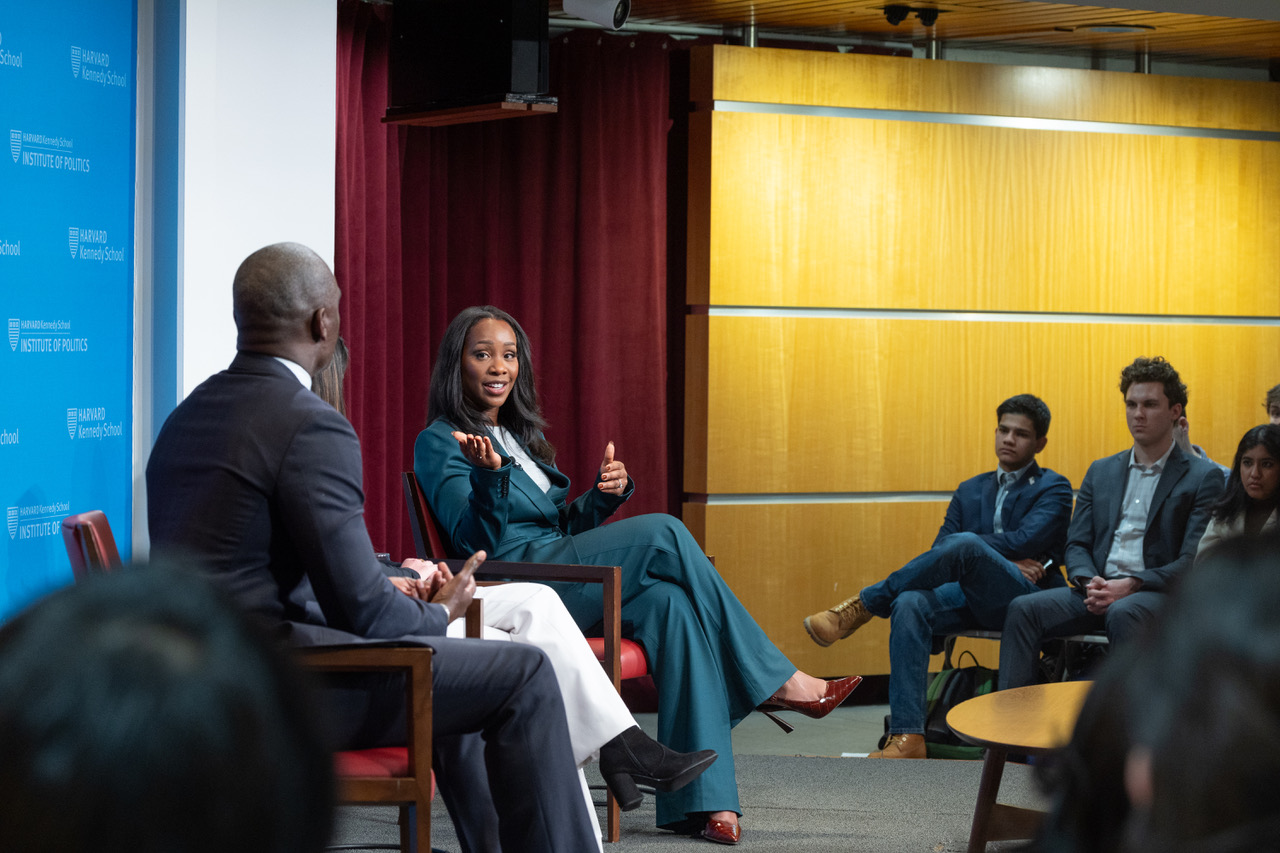
News
Harvard Grad Union Agrees To Bargain Without Ground Rules

News
Harvard Chabad Petitions to Change City Zoning Laws

News
Kestenbaum Files Opposition to Harvard’s Request for Documents

News
Harvard Agrees to a 1-Year $6 Million PILOT Agreement With the City of Cambridge

News
HUA Election Will Feature No Referenda or Survey Questions
Abby Phillip Says Nontraditional Media Outlets Helped Trump Win at Harvard IOP Forum

CNN anchor Abby D. Phillip ’10 said Donald Trump and his campaign’s focus on nontraditional media outlets contributed to his electoral victory — and could mark a broader shift towards a new type of political candidate.
“If you are a traditional candidate, as we were just talking about, how do you calibrate?” she asked at a Harvard Institute of Politics forum on Monday. “I think that this may be the end of the traditional candidate.”
Phillip, a former Crimson editor, joined journalist Eugene Scott and Liana McGhee ’26 to discuss the changing American media landscape. She pointed to both President-elect Donald Trump and Vice President Kamala Harris’s participation in nontraditional media appearances with podcasters and online influencers.
In particular, she noted the impact of conservative online media and podcasts on voters, pointing to the Trump campaign’s willingness to engage with “extremely nontraditional” sources.
“Some of these people that Trump was sitting down with are very controversial,” Phillip said. “The people who get their news from alternative sources, they give extra points for seeing you in places where they don’t expect you.”
Phillip added that while the Harris campaign also utilized “nontraditional” media sources — such as podcasts and social media — “they didn’t take many risks in doing so.”
“They still were going to places where generally they’d be well received, or generally she would be kind of celebrated,” she said.
Phillip said that Trump’s electoral success will likely force candidates to pursue similarly risky, nontraditional media strategies.
“Politicians are going to have to take note of that and figure out how they can get comfortable doing that — because that’s the future,” she said.
As a cable news anchor herself, Phillip said she recognized this shift could diminish the influence of traditional broadcast journalism.
“I feel like I have to talk about my own demise here, but that’s what it is,” she said. “People are not watching TV anymore.”
Phillip added, however, that she believes “CNN in particular remains extremely relevant” in the shifting media landscape.
In an interview with The Crimson, Phillip said that while journalists “understand the basic premise of how Donald Trump operates” from his first term, they must work to improve their coverage in his second term.
“There was so much focus in the first administration on the personalities, on the internal disputes, on the tweets, on the moods of Donald Trump and his advisers,” she said. “What we need more of is reporting on what the government is doing for — and perhaps not for — the American people.”
“That takes a lot of resources — it takes a lot of digging, it takes good journalism,” she added. “It’s not as sexy sometimes, but it’s extremely important.”
Want to keep up with breaking news? Subscribe to our email newsletter.
Related Articles
Most Read
- Harvard Dismisses Leaders of Center for Middle Eastern Studies
- Harvard Agrees to a 1-Year $6 Million PILOT Agreement With the City of Cambridge
- FAS Dean Asks Center Directors To Show Compliance With Viewpoint Diversity Guidance
- 2 Years After Affirmative Action Ruling, Harvard Admits Class of 2029 Without Releasing Data
- Adams House Resident Dean Issues Warning to Student Who Booked Room for AFRO Event
From Our Advertisers

Over 300+ courses at prestigious colleges and universities in the US and UK are at your disposal.

With innovative financial tools combined with financial education, Collegiate empowers students to take control of their finances and build confidence in their money management skills.

Serve as a proctor for Harvard Summer School (HSS) students, either in the Secondary School Program (SSP), General Program (GP), or Pre-College Program.

With an increasingly competitive Law School admissions process, it's important to understand what makes an applicant stand out.

Welcome to your one-stop gifting destination for men and women—it's like your neighborhood holiday shop, but way cooler.

Admit Expert is a premium MBA admissions consulting company, helping candidates secure admission to top B-schools across the globe with significant scholarships.
